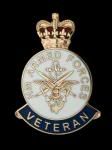LeEnfield
Active member
June 27 is almost certain to be chosen as National Veterans' Day, an occasion for honouring former servicemen and women.
The day is being championed by Gordon Brown, who hopes that it will become as established a part of the national calendar as Remembrance Sunday.
In a speech to the Royal United Services Institute today, the Chancellor will appeal to Britons to take part in local ceremonies during which veterans of conflicts ranging from the Second World War to Aden, Kosovo and Iraq will be honoured.
He will say: "I propose ceremonies in every constituency to mark National Veterans' Day, where we present veterans with veterans' medals."
Mr Brown's adoption of the day is part of a strategy aimed at widening his political appeal beyond economics before his presumed assumption of the premiership.
In his speech, which will deal mainly with measures required to counter the threat of terrorism, Mr Brown will announce the extension of the right to apply for a veteran's badge from the current limit of 1954 to all those who served in the Armed Forces until 1960. The additional years would take in the invasion of Suez in 1956 and the start of the war in Aden.
Over the next five years, veteran status is to be extended to those who have served in more recent conflicts, such as Northern Ireland, the Falklands, the Gulf war, Kosovo, Sierra Leone, Iraq and Afghanistan.
Mr Brown will suggest that greater value should be given to the "ideals of Britishness" and British symbols and institutions. He will announce a £1.5 million donation towards the new Armed Forces memorial in Staffordshire.
Mr Brown wants young people to play a central role in Veterans' Day, taping and recording the reminiscences of former servicemen for use in a new national archive financed from Government and possibly National Lottery money.
The Queen was given a number of dates in June on which to hold Veterans' Day.
A source said that June 27 was considered suitable because it fell on the day after the anniversary of the first investiture of the Victoria Cross in Hyde Park in 1857.


The day is being championed by Gordon Brown, who hopes that it will become as established a part of the national calendar as Remembrance Sunday.
In a speech to the Royal United Services Institute today, the Chancellor will appeal to Britons to take part in local ceremonies during which veterans of conflicts ranging from the Second World War to Aden, Kosovo and Iraq will be honoured.
He will say: "I propose ceremonies in every constituency to mark National Veterans' Day, where we present veterans with veterans' medals."
Mr Brown's adoption of the day is part of a strategy aimed at widening his political appeal beyond economics before his presumed assumption of the premiership.
In his speech, which will deal mainly with measures required to counter the threat of terrorism, Mr Brown will announce the extension of the right to apply for a veteran's badge from the current limit of 1954 to all those who served in the Armed Forces until 1960. The additional years would take in the invasion of Suez in 1956 and the start of the war in Aden.
Over the next five years, veteran status is to be extended to those who have served in more recent conflicts, such as Northern Ireland, the Falklands, the Gulf war, Kosovo, Sierra Leone, Iraq and Afghanistan.
Mr Brown will suggest that greater value should be given to the "ideals of Britishness" and British symbols and institutions. He will announce a £1.5 million donation towards the new Armed Forces memorial in Staffordshire.
Mr Brown wants young people to play a central role in Veterans' Day, taping and recording the reminiscences of former servicemen for use in a new national archive financed from Government and possibly National Lottery money.
The Queen was given a number of dates in June on which to hold Veterans' Day.
A source said that June 27 was considered suitable because it fell on the day after the anniversary of the first investiture of the Victoria Cross in Hyde Park in 1857.




